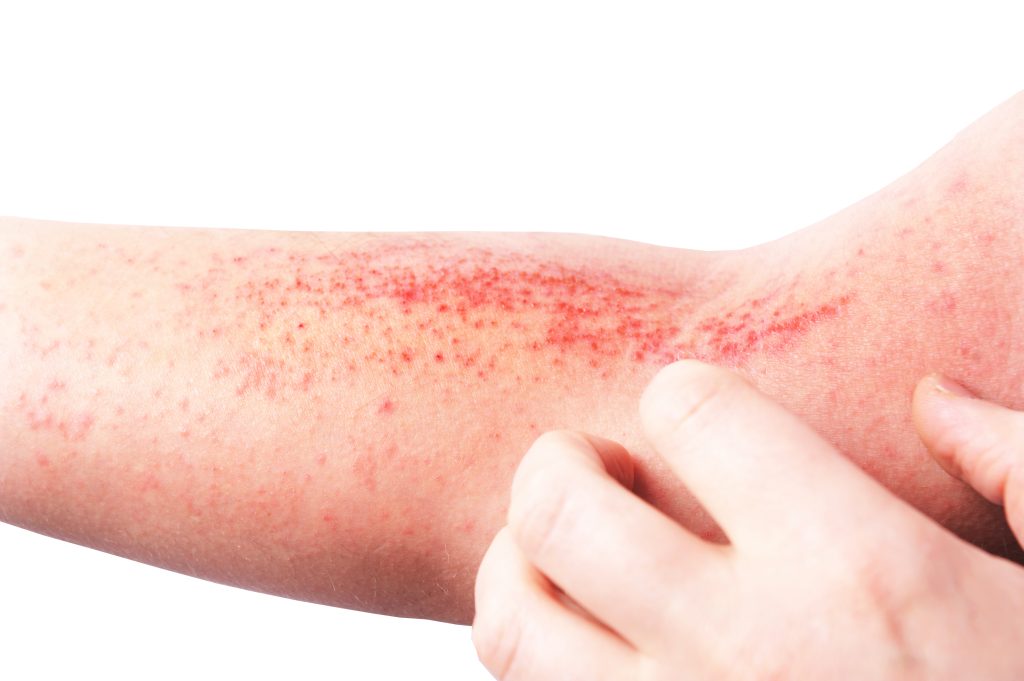Health Canada has authorized lebrikizumab (Ebglyss, Eli Lilly Canada Inc), a targeted interleukin (IL)-13 inhibitor, for the treatment of moderate-to-severe atopic dermatitis (AD) in adults and adolescents 12 years of age and older with a body weight of at least 40kg, whose disease is not well controlled despite treatment with topical prescription therapies or when those therapies are not advisable.
Lilly has exclusive rights for development and commercialization of lebrikizumab in Canada, the U.S., and the rest of the world outside Europe. Lilly’s partner Almirall S.A. has licensed the rights to develop and commercialize lebrikizumab for the treatment of dermatology indications, including atopic dermatitis, in Europe.
Health Canada’s authorization was based on results from the ADvocate 1, ADvocate 2, and ADhere studies, which included more than 1,000 adults and adolescents (aged 12 to less than 18 years who weighed at least 40 kg) with moderate-to-severe atopic dermatitis who were unable to control their symptoms with topical medicines or other systemic treatments, and who were candidates for systemic therapies.
ICYMI: Watch George Martin, MD, Founder of Maui Derm, and Ted Rosen, MD, a Professor of Dermatology at Baylor College of Medicine in Houston, TX, discuss the data supporting the use of lebrikizumab in AD at Maui Derm Summer NP/PA.
The co-primary endpoints from the ADvocate 1 and 2 monotherapy trials demonstrated that 43% and 33% of patients on achieved an IGA of 0 or 1, with a reduction of at least 2-points from baseline, as compared to 13% and 11% of patients on placebo, respectively, at 16 weeks. Similarly, 59% of patients in ADvocate 1, and 52% of patients in ADvocate 2, achieved a 75% reduction in EASI score from baseline at week 16, compared to 16% and 18% of patients on placebo . Of the patients from ADvocate 1 and 2 who were responders to lebrikizumab at week 16 and were re-randomized to 36 weeks of maintenance treatment with lebrikizumab every 4 weeks, 76.9% and 81.7% maintained their IGA 0, 1 and EASI 75 response, respectively through 52 weeks.
Key secondary endpoints at week 16 from the ADvocate 1 and 2 trials showed that 46% and 40% of patients had an improvement of at least 4 points in the Pruritus NRS compared to 13% and 12% of patients on placebo, respectively. Similarly, 38% of patients in ADvocate1 and 31% of patients in ADvocate 2 achieved an EASI 90 response compared to 9% and 10% on placebo.
The safety evaluation of lebrikizumab demonstrated that the majority of treatment emergent adverse events were mild to moderate in severity.2 The most commonly reported adverse reactions were conjunctivitis, injection site reactions, dry eye, and herpes zoster.
“As a physician, I recognize the heterogeneity of atopic dermatitis and the ongoing struggle to achieve long-term control,” says Melinda J. Gooderham, MD, Medical Director at the SKiN Centre for Dermatology and the Principal Investigator for the SKiN Research Centre in Peterborough, Ontario, Canada, in a news release. “The approval of [Ebglyss] lebrikizumab provides patients with much-needed treatment diversity. Addressing the profound impact of severe itch, impact on sleep, and overall well-being underscores the urgency for innovative dermatological therapies and expanding treatment options.”
About ADvocate 1 and 2
ADvocate 1 and 2 are 52-week randomized, double-blind, placebo-controlled, parallel-group, global, Phase 3 studies designed to evaluate lebrikizumab as monotherapy in adults and adolescents (aged 12 to less than 18 years of age and weighing at least 40 kg) with moderate-to-severe atopic dermatitis.
During the 16-week treatment induction period, patients received lebrikizumab 500 mg initially and at 2 weeks, followed by lebrikizumab 250 mg or placebo every 2 weeks. In the maintenance period, patients with moderate-to-severe atopic dermatitis who achieved a clinical response (defined as IGA (0,1) with a 2-point reduction from baseline and/or EASI 75) after 16 weeks of lebrikizumab treatment were re-randomized to receive lebrikizumab every 2 weeks or 4 weeks or placebo for an additional 36 weeks. Patients who required rescue treatment during the induction period or who did not meet protocol-defined response criteria at 16 weeks received open-label lebrikizumab every 2 weeks for an additional 36 weeks.
About ADhere
ADhere is a 16-week randomized, double-blind, placebo-controlled, parallel-group, global, Phase 3 study to evaluate the efficacy and safety of lebrikizumab in combination with topical corticosteroids (TCS) initiated in 211 adults and adolescents (aged 12 to less than 18 years of age and weighing at least 40 kg) with moderate-to-severe atopic dermatitis. In the study, patients’ baseline atopic dermatitis symptoms were inadequately controlled by TCS with or without topical calcineurin inhibitors (TCI).


